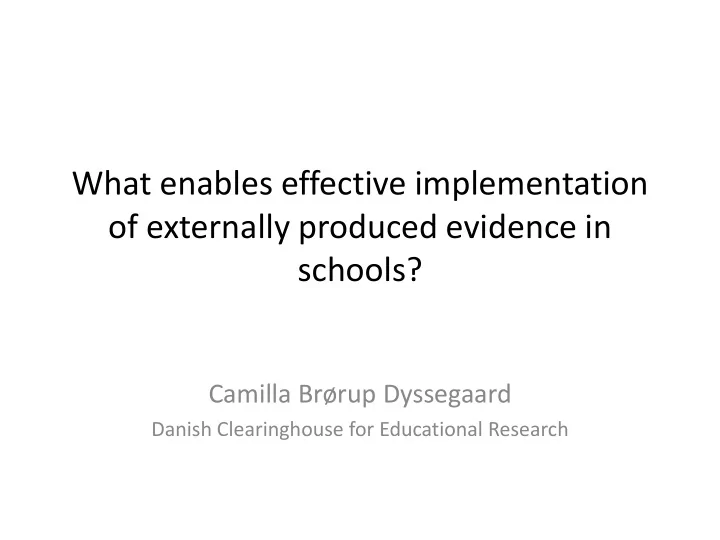

What enables effective implementation of externally produced evidence in schools? Camilla Brørup Dyssegaard Danish Clearinghouse for Educational Research
Commissioned by the Ministry of Children, Education and Gender Equality The project is two-folded : State of the field – 10 countries State of the evidence – a full systematic review.
State of the field - countries • Denmark • Sweden • Norway • Finland • England • Scotland • Ontario (Canada) • Maryland (USA) • New South Wales (Australia) • New Zealand.
State of the field - data 1. Systematic information search for policy documents, legal framework and strategy papers from governmental and non governmental organizations 2. Qualitative interviews with key informants.
State of the field – areas of interest • Policies and strategies for use of research findings in school • Economy • Research dissemination • Requirements/expectations directed at teachers • Initiatives that support knowledge exchange • Use of research in teacher education / further training of teachers • Experience with knowledge mobilization.
State of the field – generally seen • All countries have had recent reforms • All countries have some form of a national curriculum, some more fixed than others • In most countries teacher education programs are placed at universities • All countries but one have national tests • All countries have organizations that disseminate knowledge • 6 countries demand certification of teachers • 6 countries have requirements for continuing professional development • 6 countries have mandatory introduction periods.
Initial teacher training Country Teacher Education Certification Introduction period One Several Yes No Yes No Denmark X X X Sweden X X X Norway X X X Finland X X X England X X X Scotland X X X Ontario (Canada) X X X Maryland (USA) X X X New South Wales X X X (Australia) New Zealand X X X
Personal attitudes and culture change Common for all countries teachers are described as being: • Stressed on time • Stressed on curriculum • Stressed regarding preparation • Challenged in seeing the relevance of research results in their practice.
Personal attitudes and culture change The differences between some countries: • Autonomy of teachers vary • Guidelines for the curriculum><almost fixed curriculum • Respect for teachers vary • Assessment practices (use of test and data) vary.
Continued professional development • Denmark – no legal requirements • Sweden - no legal requirements • Norway – no legal requirements • Finland – legal requirement three days per year • England – no legal requirements • Scotland – legal requirement, 35 hours a year Career Long Professional Learning • Ontario (Canada) – Appraisal every five years require professional development • Maryland (USA) – all teachers must pursue professional development continually • New South Wales (Australia) – legal requirement minimum 100 hours of professional development every three years • New Zealand – legal requirement to participate in professional development minimum every three years.
Review question How can empirical research in the field be characterized in regard to origin, frequency, purpose, approach, research design, results and research quality? What promotes and/or hinders the implementation of research-based knowledge and knowledge implementation in primary and lower secondary school?
Themes • Theme 1: Fidelity • Theme 2: Professional development • Theme 3: Implementors/facilitators • Theme 4: Personal attitudes/culture change • Theme 5: Principal/leadership engagement • Theme 6: Sustainability/Life cycles.
Theme 1: Fidelity 19 studies are included under this theme: • Relevant background knowledge • Instructions should be followed adequately • Teachers believe the intervention has a positive effect • A new curriculum that is intangible and non-prescriptive is difficult to implement • High implementation scores ><unqualified staff • Implementation fidelity has vital significance for the effect of a given intervention • Lack of measures of student improvement.
Theme 2: Professional development 17 studies are included under this theme: • Five 3-hour collaborative seminars over a period of three months • Introductory training and seven monthly skill sessions + coaching • Interventions specifically target teachers skills in handling children with behavioral problems • Content and pedagogical focused courses and long- term collaboration with universities.
Theme 3: Implementors/facilitators 15 studies are included under this theme: • Team collaboration • Coaching • Teachers >< psychologist • Trained behavioral coach • Instructional consultation teams • Research assistants • Specialists.
Theme 4: Personal attitudes/culture change 15 studies are included under this theme: • Clear communication and understanding of the ”mission” • High teacher turnover limits the prevalence rate • Teachers’ ability or willingness to implement the project • Individual differences between teachers acceptance • Teachers’ engagement in interventions directly effect students • Teachers are committed to the intervention – bottom-up • Threat towards teacher’s autonomy • Teachers’ workload and lack of time.
Theme 5: Principal/leadership engagement 11 studies are included under this theme: • Knowledge of curriculum, instruction and assessment (academic support) • Flexibility and optimizers (personal support) • Trust and shared leadership • Principals as an active part of intervention implementation – especially at the start • Principals that work on continuous development of their school based on data analysis, goal-setting and achievement monitoring have positive effects on implementation • Changing principals effect the implementation adversely.
Theme 6: Sustainability/Life cycles 6 studies are included under this theme: • Sticking with the principals of the project in spite of problems faced along the way • Continued growth of new programs • Regression occurring in the second year • After end of funding – interventions are given up • Alignment of program characteristics with ongoing strategies, school policies and other programs • Continuous efforts should be made to keep the interest in the program.
Thank you for your attention
Recommend
More recommend